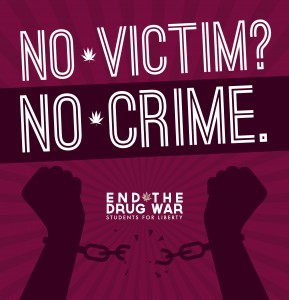EspañolOn Wednesday, Students for Liberty (SFL) launched their “End the Drug War” campaign, calling on governments around the world to end their offensive against the consumption, production, and sale of drugs.
The network of more than 1,300 university groups is addressing what they believe to be one of the worst and most tragic policies of the 20th and 21st centuries.
“’End the Drug War’ is a campaign to draw attention to the decades of failure that has been the War on Drugs, and progressive examples of decriminalization around the world,” the website states.

This educational initiative aims to prevent the deaths of more innocent people at the hands of state-sponsored violence and the notorious and brutal cartels that control the trade:
Thanks to prohibition, narcotics trafficking is an extremely lucrative business that has allowed terrorist organizations like FARC and Al-Qaeda to finance their criminal operations. In the case of FARC, it is estimated that narcotics sales represent more than 60 percent of their income. And in the case of Al-Qaeda, drug trafficking and kidnapping are their primary revenue streams. These groups are often partners in the trafficking of narcotics and weapons.
SFL maintains that state obsession with the drug war has fostered corruption and destroyed good governance. They also claim that it diverts precious funds and contributes to low levels of economic development.

But that is just the start, as they contend that the problems are countless. In Mexico alone, for example, estimates exceed 70,000 deaths at the hands of drug traffickers between 2006 and 2012.
Another consequence of the drug trade, which has generated considerable attention in the United States, is the massive migration of children from Central America. Heavier enforcement has pressured drug cartels to relocate their drug-trafficking operations to El Salvador, Guatemala, and Honduras from Mexico — to the detriment of locals.
North of the border, SFL points to the world’s highest prison population in the United States. Criminalization means police efforts go towards “victimless crimes,” rather than violence that causes harm to innocent people.
Alexander McCobin, SFL president, says “prohibition has not only failed miserably at limiting access to drugs, but has actively harmed countless individuals and societies around the world. In the United States, more than 8 million people have been arrested for marijuana possession in the last 10 years, with an annual cost of US$3.6 billion, and an immeasurable loss of human capital.”
“The war on drugs is, in reality, a war against ourselves. This has to end,” he opines.
“End the Drug War” Strategy

First, the global effort will focus on the dissemination of educational materials over the internet. Then members will actively distribute information regarding the effects of prohibition in over 18 languages and 200 universities worldwide.
Regarding the broad, international reach of the campaign, McCobin says “Young people today are demanding a change in the way we approach and legislate drug policy, and it is time that politicians and those responsible for public policy take this issue seriously.”
Frederik Cyrus Roeder, SFL’s VP of marketing and communications, told the PanAm Post that the legalization of marijuana in Uruguay was one more step to regain lost freedom from the hands of prohibition:
Giving people more authority over their own bodies is definitely a good cause. The ideal solution would be the complete legalization and liberalization of drug use, but whatever step in this direction is a relief for the individuals suffering as a result of the war on drugs.
Roeder warns that the purpose of the campaign is not to glorify drug use. Rather, it is to foster awareness of the problems and misery created at the global level by government attempts to prevent access to drugs.
Despite criticism that might arise over the idea of drug legalization, the libertarian activist says there are various examples of decriminalization around the world that have demonstrated “very positive signs.”

He said there are now 28 countries that have already decriminalized – distinct from legalization — the consumption of cannabis, including Ecuador, Colombia, Uruguay, Argentina, Denmark, and Mexico.
Although much of the campaign centers on the popular image of marijuana, Roeder maintains that the vision of the organization is the open protest of all victimless crimes: acts that are illegal, but where no identifiable individual is physically harmed.
“Ending the criminalization of drug use will lead to a more free and prosperous world,” he concludes.
Cases of Decriminalization Success
SFL draws attention to countries that have taken a more liberal stance to the formation of drug policy. In addition to the 28 countries that have eliminated prison sentences for cannabis possession, countries like Portugal have decriminalized possession of all types of drugs; and in the two years since the adoption of this policy, there has been a 50 percent reduction in deaths related to overdose.
SFL also points to the Netherlands, where, after the implementation of less restrictive drug policies, eight prisons have been closed due to underpopulation in the prison system.
 Versión Español
Versión Español












